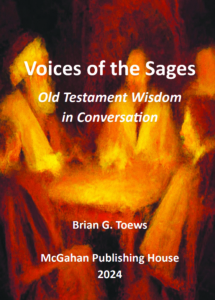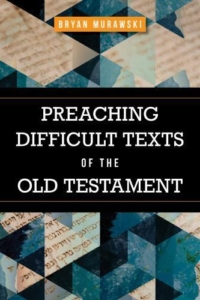“It’s embarrassing.”
That is how I answered a question in a recent podcast interview about the Bible of Jesus—what we call the Old Testament. They had asked: “In all of your experience in teaching at the university level, what would you say students find most difficult when it comes to engaging with the Old Testament?”
I answered the podcast hosts by stating that students are embarrassed because of uniformed prejudice against the Old Testament in the different spheres of students’ lives. Their friends think it’s boring. Churches minimize and correct it. And especially modern culture ridicules it.1 These things are not new. They are not in doubt. These things should be troubling. They should alarm us. That many Christians have accepted the embarrassment of the Old Testament is part of the problem.
Unpacking the embarrassment about the Bible of Jesus is personal. I say this as a Christian and as a professor of Old Testament.
Jesus is not embarrassed about his Bible. He owns it. He studies it. He teaches it. He taunts his enemies with it. He claims it teaches us all we need to know about redemption.2 If this tells us anything, it says we are wrong for being ashamed of his Bible. This means it is not enough to shake our heads and sigh about what has become of the Old Testament in our day. We need to resurrect the Bible of Jesus to its proper place in our lives.
Embarrassment About the Old Testament Among Christians
Churches tend to love the New Testament and Jesus. The Old Testament, not so much. On any given Sunday, many churchgoers are bound to hear the contrast between the Old and the New. Christian teachers and preachers speak about the New Testament Christ of love who is unlike the Old Testament God of wrath. The message also can be read in books written by leading evangelical ministers.
The pastor of a large church in Georgia thinks that the Old Testament is ruining the gospel message. He is troubled by the sharp contrast between the wrathful God of Israel and the Christ of love.3 He says the God of the Old Testament has a lot of rules. So this pastor fixes the problem by getting the Old Testament with all of its legalism out of the way. He tries to save the gospel by “unhitching” it from the old covenant.4
This pastor says: “According to Paul, Jesus’ followers are dead to the Ten Commandments. The Ten Commandments have no authority over you. None. To be clear: Thou shalt not obey the Ten Commandments.”5
This is incredibly bad advice. It is not a New Testament viewpoint. Jesus and Paul both affirm the Ten Commandments. They even say that the commands to love God and to love others are a summation of the Old Testament law.6 Despite the
teachings of Jesus and Paul, many Christians turn away from the instructions in the Old Testament.
Again and again, Christians express their relief at not needing to bother with Old Testament teachings. Congregants shake their heads at what they see as God’s legalistic treatment of ancient Israel. They sometimes even comment on how much different Jesus is. Different than God? That’s not a Christian view. It’s also mistaken.
There are only 613 laws in the Torah. This only seems like a lot until we realize that there are more than 800 commands in the New Testament.7 People worry about the oddness of the laws of Torah. True, but commands in the New Testament are odd too. Kiss one another. Women, cover your heads. Be kind to strangers in case they are angels in disguise. And many more.8
Christians complain about the difficulty of obeying the laws of Torah. These Christians need to reread the commands of Christ placed at a much more demanding level. Torah says do not murder or commit adultery. Jesus says do not act in anger or look with lust.9
Remember, we are saved by grace alone and nothing of ourselves in order to serve God by good works (Eph. 2:8–10). And the point of the great commission is “teaching them to keep all that I commanded you” (Matt. 28:20 LSB).10
The contrast between God’s wrath and Christ’s love is prevalent in our day. It has been said so often that many congregants do not realize it is a lie.
Pushing Back Against Disparagement of the Old Testament by Culture
The enemies of Christianity say that the God of the Old Testament hates people, and he is a racist. These widespread assertions are a big part of why many Christians are ashamed of the Bible of Jesus.
These brazen claims of our day against the God of the Old Testament need to be challenged. They only make sense to people who do not know the Bible of Jesus. Anyone can read the Old Testament for themselves and see that the scorn heaped upon it by our prevailing culture is misguided.
And that’s the thing: There is nothing to be afraid of. Read the Old Testament for yourself.
The following questions push back against a handful of accusations that the God of the Old Testament is a racist who hates people. Though there is more to each of these issues, this will suffice for the present purposes.
Did you know that when Israel sins, Yahweh treats them exactly like he treats the nations of Canaan? Seriously. Listen to what he says:
“[Yahweh:] But as for you [Israel], you shall keep my statutes and my judgments and shall not do any of these abominations, neither the native nor the sojourner who sojourns among you . . . so that the land will not vomit you out, should you defile it, as it has vomited out the nation which has been before you.” (Lev. 18:26, 28; cf. 20:22–23; Deut. 29:23)
Many people, including modern Christians, do not realize that Yahweh punishes his own people in the very same way as anyone else and for the same kinds of sin. It is worth evaluating the prejudices that modern readers impose upon biblical texts that emphasize Yahweh’s equality of justice.
Did you know that Yahweh punishes adulterers with the same severity as those who practice same sex relations? Really. Read Leviticus 20:
“If there is a man who commits adultery with another man’s wife . . . the adulterer and the adulteress shall surely be put to death. . . . If there is a man who lies with a male as those who lie with a woman . . . they shall surely be put to death.” (Lev. 20:10a, c, 13a, c)
God takes all kinds of illicit sexual relations as violations of what is right for those creatures made in his own image.11 He demands purity. Yahweh’s call upon his people to be holy as he is holy should be taken seriously by all Christians.
Did you know that Yahweh has always welcomed outsiders in the same way as his own people? I am not making this up.
Notice the place for outsiders as early as Torah and as late as the return from exile:
“But if a sojourner sojourns with you [Israel] and celebrates the Passover to Yahweh, let all his males be circumcised, and then let him come near to celebrate it; and he shall be like a native of the land. But no uncircumcised person may eat of it.” (Exod. 12:48)
“Then the sons of Israel who returned from exile and all those who had separated themselves from the uncleanness of the nations of the land to join them, to seek Yahweh, the God of Israel, ate the Passover.” (Ezra 6:21)
The prophets and Jesus likewise emphasize that Yahweh makes a place for outsiders to worship him.12
Did you know that Yahweh has compassion for those who are in trouble as though they are his own dependents? Look for yourself:
“You [Israel] shall not mistreat a sojourner or oppress him, for you were sojourners in the land of Egypt. You shall not afflict any widow or orphan. And if you indeed afflict him, and if he earnestly cries out to me, I will surely hear his cry.” (Exod. 22:21–23)
“Yahweh keeps the sojourners; he helps up the orphan and the widow, but he bends the way of the wicked.” (Ps. 146:9)
When Yahweh commands his people to care for outsiders, he calls them to do what he himself does.13 To love outsiders is to imitate Yahweh.
Did you know that Yahweh loves the wayward as he loves his very own? It’s true. Consider what he says about his own servant, the one who is ultimately identified as Jesus the Messiah:
“But Yahweh was pleased to crush him [the servant], putting him to grief. . . . As a result of the anguish of his soul . . . my servant, will justify the many, as he will bear their iniquities.” (Isa. 53:10a, 11a, c)
As I said, there is more to it. These examples are just a tiny fraction of the evidence that could be presented here. But this is enough to make the point. The Old Testament does not line up with the distorted attitudes about it in the modern world, and even in modern Christianity.
Resurrecting the Bible of Jesus
Consider setting aside the wrongful attitudes moderns bring against the Bible of Jesus. A place to start is taking on the attitude of Jesus toward his Bible.
We should own it. Study it. Be humbled by it. Teach it. Tell others what it says about Yahweh’s mercy.
I invite you to read it for yourself. There’s no wrong place to begin. Jesus stopped the tempter with three teachings in Deuteronomy 6–11. This section tells the people to love Yahweh who loved them first. This is one place we can start to see the Bible of Jesus resurrected to its rightful place in our lives.
The Bible of Jesus is God’s gift to those he loves.
Dr. Schnittjer’s Reading Recommendations for Resurrecting the Bible of Jesus
“Here are a few suggestions for anyone who is interested in lifting up the Old Testament to its proper place in our own lives. As I said, this is personal. As such, these suggestions come from my own research and my friendships with Old Testament professors with whom I work.”
Voices of the Sages by Dr. Brian Toews
“My long-time friend and fellow professor at Cairn, Brian Toews, has produced a first-of-its-kind introduction to the neglected wisdom writings of the Old Testament. Toews puts biblical books and biblical persons into conversation with each other to show us how to interpret the scriptures by the scriptures.
In Brian’s book, David and Naomi interact with Job. Esther gets advice from the likes of Daniel, Ruth, Lady Wisdom of Proverbs, and even the chorus in Song of Songs. These and many other conversations not only reveal how God’s wisdom works, they teach us to understand his biblical teachings in new ways. Toews’ book has helped me to understand biblical wisdom.”
Voices of the Sages: Old Testament Wisdom in Conversation is forthcoming from McGahan Publishing House in 2024.
Torah Story and Old Testament Narrative Books: The Israel Story by Dr. Gary Schnittjer
“My own research and teaching on the Torah story and the Israel story led to two books that come right out of the classroom at Cairn—Torah Story, 2nd edition (Zondervan Academic, 2023) and Old Testament Narrative Books: The Israel Story (B&H Academic, 2023). Both books offer entry-level introduction to these frequently misunderstood Old
Testament writings.
The thesis of Torah Story is that the gospel starts with “In the beginning;” continues through Deuteronomy; and culminates in the teaching, death, and resurrection of Jesus. Old Testament Narrative Books shows how the Israel story connects the promises of Moses to the gospel of the Messiah.”
Preaching Difficult Texts of the Old Testament by Dr. Bryan Murawski
“My good friend Bryan Murawski teaches Old Testament at Cairn. He uses his sense of humor to guide pastors in his book Preaching Difficult Texts of the Old Testament (Hendrickson Academic, 2021). Though it is aimed at ministers, this introductory-level book applies to any Christian who teaches at church or in Bible studies.
Murawski’s thesis is that if all Scripture is inspired, we need to teach all of it. This includes the widely ignored parts of the Old Testament like genealogies, lists, laws, violence, racy texts, and so on.
(Before you yawn, thinking that sounds boring, I need to tell you that every chapter had me laughing out loud. My wife wondered what I was reading.) Murawski’s book helped me understand how to investigate and teach challenging parts of the Old Testament. It can help you too.”
Dr. Gary Edward Schnittjer is the distinguished professor of Old Testament in the School of Divinity. He can be reached at ges@cairn.edu.
- See interview at Hebrew Bible Insights linked on my faculty page: https://cairn.edu/faculty/gary-edward-schnittjer/ ↩︎
- See Luke 16:31. ↩︎
- See Andy Stanley, Irresistible: Reclaiming the New that Jesus Unleashed for the World (Grand Rapids: Zondervan, 2018), 223, 257. ↩︎
- See ibid., 209, 278, 280, 315. ↩︎
- Ibid., 136. ↩︎
- See, e.g., Matt. 22:39–40; Rom. 13:8–10; Gal. 5:14. And see Matt. 7:12; Col. 3:14; James 2:8. ↩︎
- See https://scriptureworkshop.com/bh/x/n/nt_commands_list.pdf ↩︎
- See 1 Cor. 11:6; 16:20; Heb. 13:2. ↩︎
- See Exod. 20:13–14; Matt. 5:21–22, 27–28. ↩︎
- Unless stated otherwise, biblical translations come from Legacy Standard Bible—capitalization and emphasis modified. All emphasis is mine. ↩︎
- For an introductory explanation of the teachings of sexual purity in Leviticus, see Gary Edward Schnittjer, Torah Story, 2nd ed. (Grand Rapids: Zondervan Academic, 2023), 297–98. ↩︎
- See, e.g., Isa. 56:6–7; Mark 11:17. ↩︎
- See Deut. 10:18–19. ↩︎



